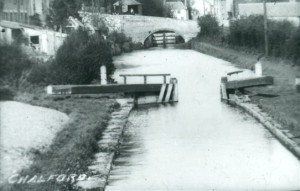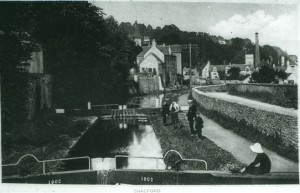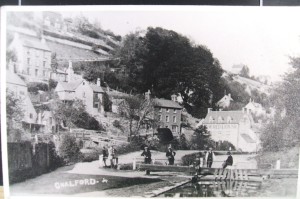It is so difficult to imagine what it must have felt like to wake up in a World newly at peace after more than four years of war. For those who knew definitively that their friends and relatives were safe, the prospect of their return home at some point in the near future would have been a huge relief – though of course, many families had to wait a surprisingly long time before they were reunited. Others would have been consumed by anxiety about those who were injured, missing or prisoners. Many would have been traumatised by the loss of their sons, husbands and brothers. Everyone, in our villages, would have known many bereaved families.
Though lighting restrictions were lifted immediately, food and fuel were still in short supply. The prevailing mood, once the exhilaration of the Armistice had dissipated a little, was one of exhaustion. The innocent optimism of 1913 would never return.
There was positive news about Ballinger’s Bridge, however – after only 25 years of concerns about its narrowness, it was being widened! Private funding had been organised by Mr John Ferrabee (‘who at the time was closely connected with the business carried out at Bliss Mills’); Charles Appleby, JP, had contributed, ‘which enabled Sir Aston Lister, JP, CC, the acting County Surveyor, to obtain the sanction of the County Council for the scheme’. Local ‘inhabitants are well-satisfied with the improvements’ to what had been ‘a very dangerous spot’.
Ballinger’s Bridge Ballinger’s Lock
Further up the canal, behind the High Street, there was light relief in the form of a minor accident (which, incidentally, throws an interesting light on the condition of the locks):
Much amusement has been occasioned in the district by the sinking – certain wags suggest that this was due to enemy action – on Friday last of a boat with a full cargo of coal in the Bell Harbour, or Lock, Chalford, thus completely severing water communication between the West and London!…The boat, which is the property of the Stroud Water Company, has been used for the conveyance of coal to the company’s works , that commodity being brought to the boat from the station to a point near the bridge at the bottom of the approach to the railway station. The boat and cargo were safely towed into port, otherwise the lock, preparatory to making the journey to the Works. The boat was temporarily left in the full lock, which leaks considerably, and during the absence of the “hands” the lock emptied, with the result that part of the boat, which had been fastened to the top end of the lock, got onto the sill, and eventually dropped to the bottom of the structure, practically breaking its back. The removal of the obstruction will involve considerable time and labour.
Frank Martin of Chalford was home on leave at this auspicious time. Aquaticus commented, ‘should think he was very acceptable in the army, for he is a dab [sic] on the piano, and the presence of a fellow like that often makes life passable in the barracks’.
(Another pianist!) Roy Essex’s citation for the Military Cross was quoted:
This officer handled the company in a rearguard action under heavy fire, with consummate skill, covering the withdrawal of the Battalion most successfully. Later he held out for 20 hours with his company in a strong point against repeated attacks and point-blank artillery fire.
Several concerts were held – it was, after all, the run-up to Christmas. Australian troops gave one of their popular shows at the Tabernacle Schoolroom, in aid of St Dunstan’s. Miss Marie Philpotts had organised another entertainment in the Church Rooms, in aid of the parcels fund – 1918’s parcels had already been despatched, and servicemen would not return, in many cases, for many months, so would still be cheered by food and other items from home. The Journal remarked on Miss Philpotts’ ‘genius for organisation’ and reported:
The room was crowded long before the appointed time…Wedged into a very small compass the audience waited patiently for the curtain to rise, the kindly Vicar of the Parish [presumably Addenbrooke] setting an example of industry to his parishioners, and incidentally providing them with a little amusement, by producing his knitting and serenely plying his needles.
The concert raised a very reputable £15 14/-.
The VTC had served its purpose. Aquaticus lamented ‘…we think it a shame that such a body or Corps should at any time be allowed to vanish completely’.
There continued to be sad news, however. The death was reported of Ernest Halliday, of Chalford, who before the war had worked as a fitter in the FES Motor Works, Gloucester. He had enlisted on 12th August 1914 in the Royal Field Artillery with his friend David Griffin (also from Chalford). As mechanics, they were eligible for enhanced pay. David Griffin was killed in 1916. Ernest survived the fighting, but, while based in Salonika, fell ill with the influenza. He was admitted to hospital on 6th November, and died on 8th November, aged 29.




